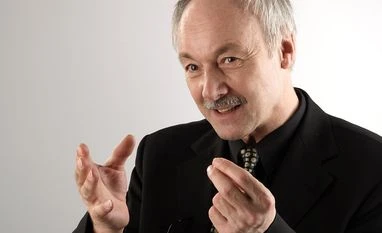Günter Faltin is worried about the future of Darjeeling tea. The 78-year-old German may be a professor of economics but he does know a thing or two about the “champagne of teas”. After all, Faltin’s venture, Teekampagne, happens to be the single largest importer of leaf tea from Darjeeling.
As a young professor at Freie Universität Berlin (Free University of Berlin) –where Faltin established the entrepreneurship department – he wanted a model for better economics. The idea was to create a new standard of business within a capitalistic framework. Teekampagne (tea campaign) popped into his head in 1978 and finally took shape in 1985.
The main pillars of the philosophy were: to be fair to workers, nature and consumers. The higher expenses for labour and nature were compensated by overturning the British colonial architecture of the tea trade.
From the plantation to the household there were a lot of intermediaries which increased the price of tea, Faltin explained.
“But we could save if we circumvented it. So we first started with the exporters but then went directly to the producers after 1992,” the professor said, on his visit to India and Darjeeling after six to eight years, said. And there was little need to invest in marketing because the story Faltin chose to sell was the world’s best tea – the Darjeeling first flush.
By reinventing the trade, Teemkagne grew to become the largest mail-order tea business in Germany. “It was successful from the beginning,” Faltin said.
But more than three decades later Darjeeling tea finds itself in a swamp of problems. Climate change and labour absenteeism are driving down production and Nepal tea, a seemingly close cousin of Darjeeling, is burning its popularity.
“I am worried about the future of Darjeeling. Migration of labourers to the cities, steeply increasing wages, chemical residue problems by wind and water, and climate change is making it difficult. The harvest is going down,” he said.
In 2022, Darjeeling clocked in a production of 6.6 million kg (mkg) – it was a record low barring 2017 when the gardens had to shut down for 104 days due to the Gorkhaland agitation.
Lower production however is not Faltin’s only concern. Teekampagne’s mainstay is Darjeeling – it buys about 360 tonnes a year and most first, second flush and green Darjeeling (the major supplier is the Chamong group, the largest producer of Darjeeling tea at 1 million kg). But it’s stagnating.
That’s why in the last three years, Teekampagne started offering Assam tea, to enrich the assortment. Volumes are small though at about 30 to 40 tonnes (revenues of Teekampagne are around 10 million euros).
What could be the win-back strategy for Darjeeling tea? Focus on quality is the only way, Faltin says, citing the example of Bordeaux wine.
“About 20 years back, Bordeaux was down. People thought there was nothing special about it and it was also up against cheaters. But Bordeaux got its act together, fought the cheaters and improved quality. That’s how it survived,” Faltin pointed out.
As far as beating the “cheaters” of Darjeeling tea is concerned, Faltin believes that the Tea Board needs to enforce Darjeeling’s geographical indication (GI) tag better. A lot more tea is sold as Darjeeling tea in the world than the region produces.
Teekampagne’s consumers are tea aficionados; they can tell the difference between the fresh, delicate first flush with muscatel notes and the stronger, smoother second flush having a more pronounced muscatel flavour. But is their tribe growing?
“Some of our customers are my age. The young people on social media do not buy Darjeeling tea,” Faltin admitted.
But Faltin, who has founded and co-founded many ventures, is determined to stay the course in his campaign for “unadulterated tea”. After all, Teekampagne was his first brainchild.
The journey ahead for Darjeeling tea may be riddled with challenges but then the professor is taken by Winston Churchill’s famous line – if you’re going through hell, keep going.
Unlock 30+ premium stories daily hand-picked by our editors, across devices on browser and app.
Pick your 5 favourite companies, get a daily email with all news updates on them.
Full access to our intuitive epaper - clip, save, share articles from any device; newspaper archives from 2006.
Preferential invites to Business Standard events.
Curated newsletters on markets, personal finance, policy & politics, start-ups, technology, and more.
)